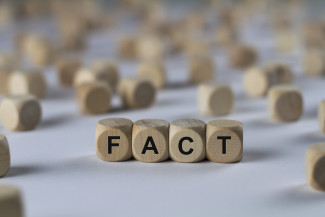
Johns Hopkins UniversityEst. 1876
America’s First Research University
Is That a Fact?


The sociologist-senator Daniel Patrick Moynihan famously exclaimed that “everyone is entitled to his own opinion, but not his own facts.” As the recent US presidential election has demonstrated, however, much of the voting public would seem to disagree. They are decidedly split not only in their opinions on political matters, but also on the very facts that inform those opinions.
It isn’t difficult to see how we arrived at such a situation. Many people now get their information (when they get it at all) from deeply ideological news outlets on both the Right and the Left, or through a pervasive social media that is not accountable to traditional journalistic norms. As a key player in this media, Facebook has recently announced efforts to reduce the amount of misinformation that has been spread on the site where many people—especially younger people—now get their news. This is a welcome recognition of the problem, even if it comes somewhat after the fact. Perhaps this is all the logical extension of what Stephen Colbert coined as “truthiness” more than a decade ago to account for the gut feeling that something is true, whether it can be proven or not (an extensive account of the term can be read about on the crowdsourced Wikipedia page). But “truth” is no longer pitted against “fact.” The two have become one in the eye of the beholder.
Of course, none of this started with the most recent election cycle. Disputes over, or just plain disregard for, facts can be found throughout history. My recent book, Poetic Modernism in the Culture of Mass Print, considers this phenomenon in one specific way as it examines the production and dissemination of modern poetry. Throughout the book, I consider how late-nineteenth- and early-twentieth-century print culture helped to construct the narratives and “facts” about modern poetry as we have come to understand them today. In their conflation of the material book and literary text, I argue, book collectors helped produce a restricted literary tradition that would inform modernist literary production. This is counterpointed by the scrapbooker’s construction of a personal history and identity through newspapers, magazines, and other ephemera—the print equivalent to today’s social media. Likewise, the publishing of volumes of selected and collected poems, alongside the rise of the public poetry archive in the middle decades of the twentieth century, helped dictate which modern poets and poems would leave a lasting impression. We’re all familiar with T. S. Eliot, but how many of us know the poems of Carolyn Wells?
Even as Poetic Modernism focuses specifically of modern poetry, it is my hope that this particular subject can be taken in a more general way as a historical study of how ideas are subject to material and institutional forces often transcending the individual. Even the fact that a poem existed can be lost to history if there is not a mechanism to keep it available. At times, this can be the result of deliberate suppression; at other times this is accident or negligence. Without these facts, however, it is possible—and even likely—that false narratives and assumptions will prevail. As I show in my book, in the realm of modern poetry these assumptions are often formal and aesthetic (though also political). But these same principles of inclusion and exclusion, based on being able to trace a thing back to the fact of existence, goes for other cultural productions, ideas, and people as well.
Understanding the ways in which past facts have or have not remained in circulation might help us to reflect on our current predicaments and invite us to ask some difficult questions about how facts are established, by whom, and at what expense. We could do worse than engage in such reflection today.
Bartholomew Brinkman is an assistant professor of English at Framingham State University. His book, Poetic Modernism in the Culture of Mass Print, is available now.


